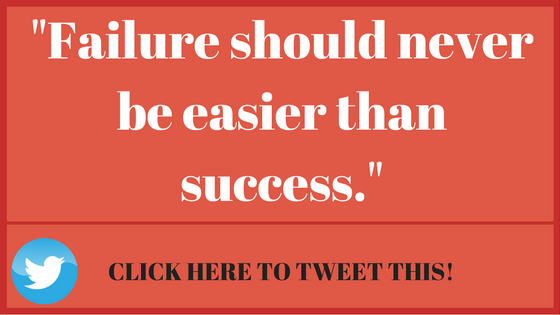The Cycle of Failure:
We’ve all been in the situation with that “difficult” student in our classroom, where they shut down, let out a sigh of discontent, and throw an assignment aside while saying something like “I’m not doing this!”
I know this can be frustrating as an educator, but I want you to think about something other than trying to correct the students action.
I want you to think: “Why are they doing this?”
Chances are (depending on what age you teach) that student has not been successful in school for most of their academic career. So far, in return for the effort they give, they’ve only ever received low grades, judgmental comments, or looks of disappointment. If this has been happening for 3, 5, or 10 years I can’t really blame them for shutting down and not wanting to continue the cycle of failure they are stuck in.
This can help explain not only the actions of the student, but more importantly, the reasons behind it.
Re-Framing Failure as Opportunity:
John Dewey, the famous educational theorist, once stated: “Failure is instructive. The person who really thinks learns quite as much from his failures as from his successes.”
This is truly a concept that education needs to adopt in order to save those students stuck in the cycle of failure. Instead of looking at failure as the end of the learning process we must start to see it as part of the journey.
Failure shouldn’t mean that a student’s work is done. It should mean that they need to rework, relearn, and correct their thoughts and responses. Once the cycle is changed from judgment, to providing the opportunity to fix and review their learning, it becomes an invaluable learning tool.
F.A.I.L. = First Attempt In Learning
In my classroom, and in the classrooms of many of the teachers we work with, failing has evolved a new meaning. F.A.I.L. now stands for First Attempt In Learning, instead of some depressing, defeating end result. When my students fail, they get to re-work and revisit their learning and correct their mistakes. Through this they learn the content in a more focused way targeted to their specific misconceptions.
For some, this can be a difficult concept to grab, but my question will always be:
What’s more important; ‘WHEN’ a student learns or ‘THAT’ a student learns?
Most teachers just want their students to learn the material. The ‘when’ becomes much less important as you stop focusing on a curriculum map or pacing guide and start to focus more on student learning.
Whether you teach more traditionally or are trying some of the newer instructional methods like Mastery Learning or PBL’s, failure is an integral part of the learning process. We never learn to walk without stumbling, no one ever road a bike perfect the first time, and you don’t even want to know what it sound like when I first got my drum set!
We never learn any skill without failing more times than we succeed. It is through failure that success is found and learning can truly occur.
Don’t be afraid to let your students FAIL. It’s amazing, the change that this mindset has had on my classroom and many others I’ve worked with. Once student take ownership and realize they can’t pull the escape hatch of failure, they will try harder the first time and increase their efforts.
Remember: Failure should never be easier than success. Create an environment in your classroom where failing is more work than success, and one where your students can thrive in the process of learning!


